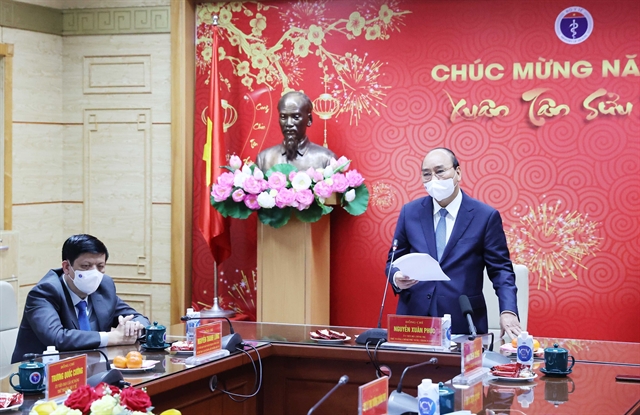 Society
Society

Prime Minister Nguyễn Xuân Phúc on Tuesday praised the efforts of the health workers who are still working tirelessly at the forefront of the fight against COVID-19 outbreaks in Việt Nam while Tết (Lunar New Year) holiday has already started.
.jpg)
|
| Health workers in HCM City taking samples for COVID-19 testing at Tân Sơn Nhất International Airport in HCM City on Saturday.— VNA/VNS Photo |
HÀ NỘI — Prime Minister Nguyễn Xuân Phúc on Tuesday praised the efforts of the health workers who are still working tirelessly at the forefront of the fight against COVID-19 outbreaks in Việt Nam while the Tết (Lunar New Year) holiday has already started.
“The health sector continues to be the pandemic frontline force who protects public health from the north to the south, in all 63 cities and provinces, especially in the worst virus-affected areas like HCM City, Hà Nội, Hải Dương, Quảng Ninh, Gia Lai,” PM Phúc said at the meeting with health authorities and hospital leaders of localities reporting outbreaks in the latest wave of community infections hitting the country.
At the meeting, PM Phúc said the health workers have displayed a strong sense of responsibility and undaunted spirit and sacrifices in the fight against COVID-19, and are ready to persevere at the hot spots.
“I know that since the pandemic began, many of you have not been able to return home and meet your family, many have to put their personal affairs on hold to treat COVID-19 patients, many young medical students have volunteered to come to the outbreak-hit regions and are willing to spend Tết holiday away from home,” PM Phúc said, adding that “the Government and health ministry are truly moved and highly appreciate these actions.”
PM Phúc sent his regards to all health workers, especially those in outbreak areas, as well as their families.
He asked that the sector must be sure to provide the highest degree of protection for the doctors, nurses, and healthcare workers and not let cross infections occur among them.
PM Phúc called on the public to continue supporting the health authorities in the fight against the pandemic, especially in observing the 5K message – Khẩu trang (facemask) – Khử khuẩn (disinfection) – Khoảng cách (distance) – Không tụ tập (no gathering) – Khai báo y tế (health declaration).
The Government leader at the meeting has also announced the signing of Decision 17 regarding COVID-19 financial support regime for the health workers and other personnel serving at quarantine facilities, officials and soldiers on guard duty at the border areas, and quarantined people, during the Tết holiday.

|
| Prime Minister Nguyễn Xuân Phúc at Tuesday meeting with health authorities. — VNA/VNS Photo |
Community outbreaks
At the meeting, Trần Như Dương, Deputy Director of the National Institute of Hygiene and Epidemiology, who headed up the task force to deal with the country’s current COVID-19 epicentre in Hải Dương Province, said since the discovery of the first community case in this latest wave on January 27, Hải Dương has identified and quarantined 12,000 direct contacts and conducted testing for 75,000 people.
“Experts and technicians deployed to assist Hải Dương Province have been stationed since January 27 and no one has returned yet,” Dương told the meeting.
The outbreak in Hải Dương, which has so far recorded over 300 cases, is caused by the highly transmissible coronavirus variant first identified in the UK, so all health workers are fighting the outbreaks with ‘four rapids’ – rapid identification of affected areas, rapid contact tracing, rapid quarantining, and rapid testing.
“We are committed to persevere in Hải Dương until the very end [of this outbreak],” Dương said.
Deputy health minister Nguyễn Trường Sơn said the health ministry has set up a special COVID-19 task force at HCM City since Monday to deal with the new outbreak connected to a group of baggage handlers at Tân Sơn Nhất International Airport.
All health resources at the southern metropolis are on call to fight the outbreaks even during the Tết holiday, Sơn said.
The outbreak in HCM City, with so far over 30 cases, is not related to the one in Hải Dương, as it involves the older version of the coronavirus, nor it is the biggest one, but one that is very complicated, according to health officials.
Trần Đắc Phu, former Director of General Department of Preventive Medicine, currently a senior advisor at the Public Health Emergency Operations Centre, said the origin of the outbreak in HCM City might be difficult to find and the virus might have been circulating silently for a while.
Many direct close contacts (F1) of the confirmed positive cases are negative for the virus, while some who had contact with these F1 cases turned up positive, so it’s possible that the F1 cases have contracted the disease but didn’t have symptoms, unknowingly passed the virus on to others, and have already recovered, Phu said.
The outbreak at Tân Sơn Nhất International Airport also might not be the source that started it all, Phu said, urging the city to conduct mass – but still selective – testing using pooled sample testing method to faster identify areas of risks to contain the outbreaks.
HCM City is preparing 840 COVID-19 treatment patient beds, and 30 ICU beds, and when necessary, the number could go up to 1,400 and 60 beds, respectively.
The city is currently capable of collecting 100,000 samples a day, and testing 30-40,000 samples within 24 hours, according to HCM City's health officials.




